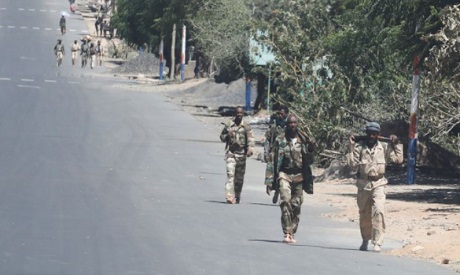
FILE PHOTO Troops in Eritrean uniforms walk in the town of Bizet, Ethiopia, March 14, 2021 REUTERS
Numerous Western countries voiced alarm at the UN Human Rights Council on Monday over ongoing serious violations in Eritrea, focusing on alleged abuses by Eritrean troops in Ethiopia's Tigray region.
The new UN special rapporteur on the rights situation in Eritrea, Mohamed Abdelsalam Babiker, painted a bleak picture in his first report to the council, and his concerns were echoed by a long line of national representatives.
There was no sign of improvement to the country's rights situation, he said, pointing to arbitrary and incommunicado detention, inhumane prison conditions, lack of basic freedoms, and indefinite military service, where conscripts are subjected to forced labour and sexual violence.
And with Eritrea's incursion into neighbouring Ethiopia's northern Tigray region, it had extended its long-criticised abuses "extra-territorially", Babikar said.
Eritrea, an impoverished country in the Horn of Africa, is one of the world's most repressive states, according to rights groups, despite a surprise 2018 peace deal with longtime foe Ethiopia.
The rapprochement ended a two-decade war, but also paved the way for the Eritrean military to join in when the Ethiopian government last November sent troops into Tigray to detain and disarm leaders of the Tigray People's Liberation Front, the region's former ruling party and bitter enemy of Eritrea.
Eritrean troops stand accused of massacring civilians and forcing Eritrean refugees back across the border, according to rights groups.
- 'Killings, rape' -
Allison Lombardo, the US Deputy Assistant Secretary at the Bureau of International Organization Affairs, said Washington was "gravely concerned" at the violations committed by Eritrean troops in Tigray.
She pointed to "extrajudicial killings, rape, and sexual violence, and ... credible reports that they are forcibly returning Eritrean refugees".
"We also remain gravely concerned about their role in preventing humanitarian access to populations in Tigray, directly contributing to conditions of famine," she said.
Britain's human rights ambassador in Geneva, Rita French, agreed, insisting that "intentional use of starvation of civilians as a weapon of war is completely unacceptable."
Demanding the immediate withdrawal of Eritrean troops, she stressed that "it is essential that all those responsible for human rights violations and abuses be held to account."
That call was echoed by the United States, the European Union and a long line of other countries.
"Impunity cannot be accepted. Perpetrators need to be brought to justice," Norwegian Ambassador Tine Morch Smith told the council, speaking on behalf of the Nordic and Baltic countries.
Eritrean Ambassador Tesfamicael Gerahtu rejected the allegations as a "disinformation campaign".
He also argued that the discussion before the council should focus only on the situation inside Eritrea, and called on the council to "delete" all comments about events beyond its borders.
That argument was backed by several other countries, including Ethiopia, North Korea and Venezuela.
The UN High Commissioner for Human Rights Michelle Bachelet told the council earlier on Monday that her office had since mid-May been conducting a joint investigation in Tigray with the Ethiopian Human Rights Commission.
"We expect this work to conclude in August," she said.
Short link: